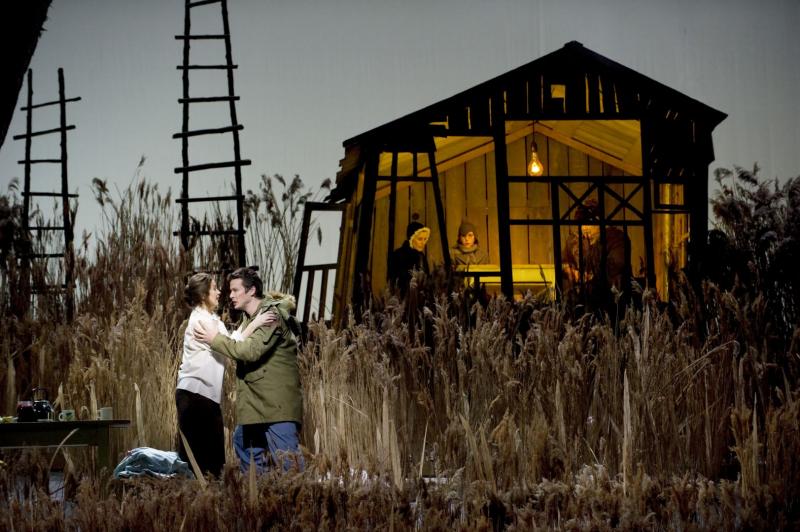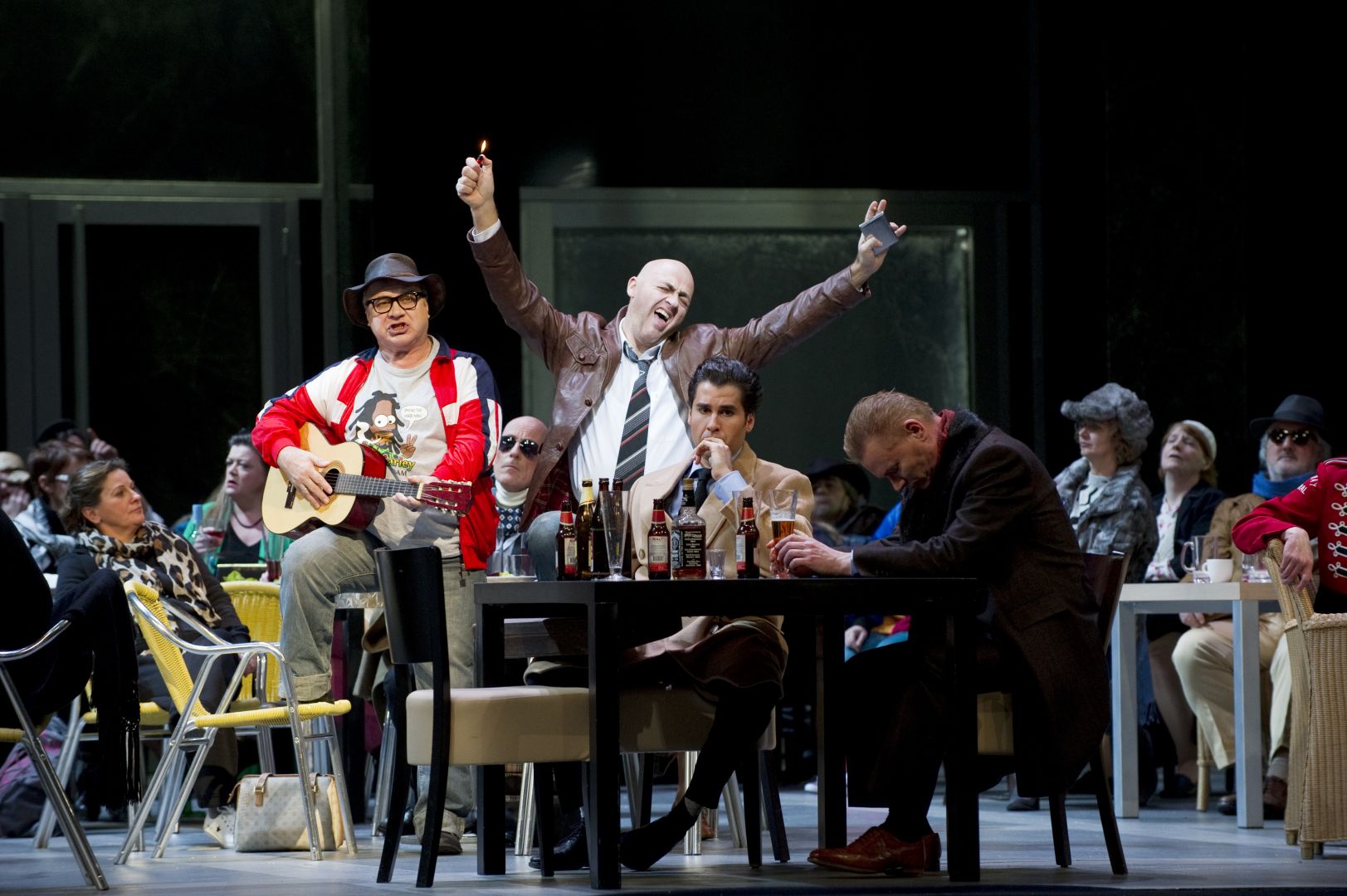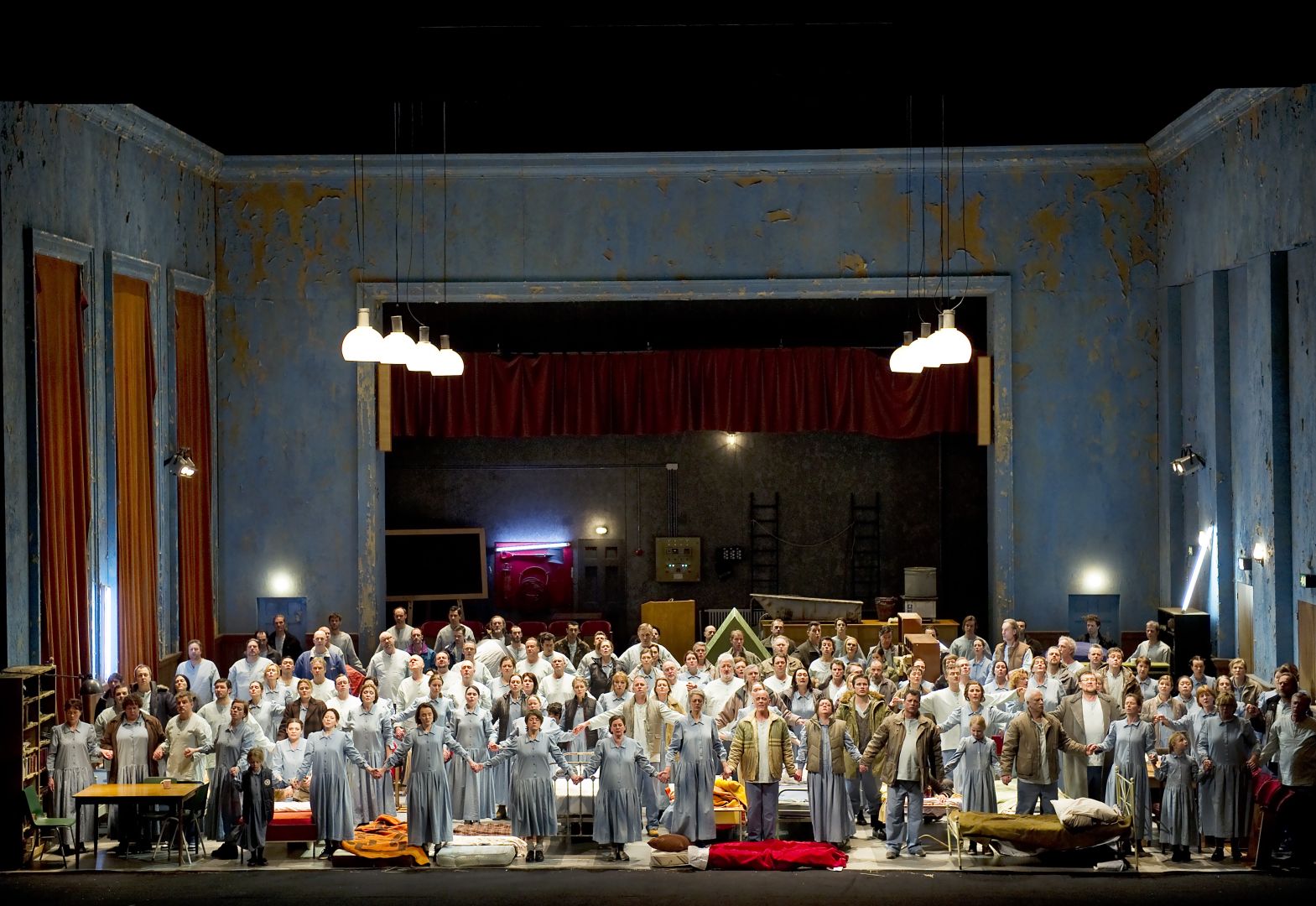The Legend of the Invisible City of Kitezh, Dutch National Opera, OperaVision review - fairy-tale good and evil made real | reviews, news & interviews
The Legend of the Invisible City of Kitezh, Dutch National Opera, OperaVision review - fairy-tale good and evil made real
The Legend of the Invisible City of Kitezh, Dutch National Opera, OperaVision review - fairy-tale good and evil made real
Rimsky-Korsakov's myth resonates in the highest musical and production standards

How do you render pure goodness interesting? Unorthodox director Dmitri Tcherniakov and radiant young soprano Svetlana Ignatovich make us smile and break our hearts with their take on the maiden Fevroniya: living at one with nature, seeing God in everything and destroyed by her encounter with civic life.
Tcherniakov is on a roll with Rimsky, whose operatic time seems to have come again: this is a dark answer to the spring beauty of his Snow Maiden for Paris Opera, and a welcome addition to the online treasury of OperaVision, available for free much longer than the Sadko for the Bolshoi Gavin Dixon reviewed last week. The score seems to be complete (there may be cuts, but only small ones); the one previous production of Kitezh I've seen, by the late, great Harry Kupfer for Berlin's Komische Oper, shed about an hour's worth of music (Gergiev's two Mariinsky concert performances at the Barbican told the whole story). At three hours there is no easily discardable music, but you need patience to go with Fevroniya's final vision of a resurrected Kitezh.
There are the kind of symmetries here that another great director, Richard Jones, always finds, illuminating what may have puzzled us in the first place. Fevroniya's forest is a blasted marsh with a few trees and a half-ruined cabin, what remains perhaps after some ecological disaster in the near future (Tcherniakov is helpfully unspecific). It still looks painterly in Tcherniakov's own designs, lit by Gleb Filshtinsky, but It blooms, both in the first and last acts, only in Fevroniya's imagination. Her friends, a crane, a bear and an elk (the translation here has 'goat'), are a boy, an old man and an old woman who's painted a canvas to provide the only splash of colour in the bleached landscape. The citizens of Little and Greater Kitezh gather in bleak community halls; the small group of four and the slain gather together to share a table and break bread back in the "forest" towards the end.  It's simple, real, moving, and horrifying when the invaders wreak their expected devastation. Tcherniakov has a way of getting even the chorus - magnificent, the Dutch house's regulars plus the Netherlands Concert Choir to play the Tatars in the second and third acts - to react believably to every situation. Ignatovich's mobile responses are riveting throughout, matched to an impressive technique; her youth is reflected in tenor Maxim Aksenov's Prince Vsevolod, who meets Fevroniya in the woods and summons her to Kitezh to marry him. John Daszak turns in a vivd performance in the most complex role, the treacherous drunkard Grishka Kuterma, more an edgy psychopath than a tipsy loafer (pictured above with chorus and Gennady Bezzubenkov on the left). Redemption doesn't seem on the cards for him despite Fevroniya's special pleading.
It's simple, real, moving, and horrifying when the invaders wreak their expected devastation. Tcherniakov has a way of getting even the chorus - magnificent, the Dutch house's regulars plus the Netherlands Concert Choir to play the Tatars in the second and third acts - to react believably to every situation. Ignatovich's mobile responses are riveting throughout, matched to an impressive technique; her youth is reflected in tenor Maxim Aksenov's Prince Vsevolod, who meets Fevroniya in the woods and summons her to Kitezh to marry him. John Daszak turns in a vivd performance in the most complex role, the treacherous drunkard Grishka Kuterma, more an edgy psychopath than a tipsy loafer (pictured above with chorus and Gennady Bezzubenkov on the left). Redemption doesn't seem on the cards for him despite Fevroniya's special pleading.
Luxury comes in the shape of three great basses familiar from Gergiev's Mariinsky company: Vladimir Vaneev as Vsevolod's father Yuri, very moving in his prayer as the greater Kitezhans expect annihilation in the hypnotic Act Three Scene One; Gennady Bezzubenkov, luxury casting as the Gusli (here guitar) Player of Act Two; and Vladimir Ognovenko as threatening Tatar Burunday. Golden sounds, too, from Alexey Markov as prince's right-hand man Poyarok and Mayram Sokolova (page/boy in the original, Poyarok's sympathetic wife according to Tcherniakov).  The versatile Albrecht, who's clearly to Amsterdam's fine house what Antonio Pappano is to the Royal Opera, catches all the jewelled facets of the score and makes the violence more real, less two-dimensional villainous roustabout, than usual. That the company could manage this many-charactered epic is probably due to the sharing with La Scala Milan and Barcelona's Liceu; certainly it's a perfect jewel in the company's crown. I wonder if any of our houses will be able to afford this kind of thing post C-19 - remember that Opera North did The Snow Maiden proud a couple of seasons back - but certainly Rimsky-Korsakov is beginning to take his place alongside the greats worldwide.
The versatile Albrecht, who's clearly to Amsterdam's fine house what Antonio Pappano is to the Royal Opera, catches all the jewelled facets of the score and makes the violence more real, less two-dimensional villainous roustabout, than usual. That the company could manage this many-charactered epic is probably due to the sharing with La Scala Milan and Barcelona's Liceu; certainly it's a perfect jewel in the company's crown. I wonder if any of our houses will be able to afford this kind of thing post C-19 - remember that Opera North did The Snow Maiden proud a couple of seasons back - but certainly Rimsky-Korsakov is beginning to take his place alongside the greats worldwide.
The future of Arts Journalism
You can stop theartsdesk.com closing!
We urgently need financing to survive. Our fundraising drive has thus far raised £49,000 but we need to reach £100,000 or we will be forced to close. Please contribute here: https://gofund.me/c3f6033d
And if you can forward this information to anyone who might assist, we’d be grateful.

Subscribe to theartsdesk.com
Thank you for continuing to read our work on theartsdesk.com. For unlimited access to every article in its entirety, including our archive of more than 15,000 pieces, we're asking for £5 per month or £40 per year. We feel it's a very good deal, and hope you do too.
To take a subscription now simply click here.
And if you're looking for that extra gift for a friend or family member, why not treat them to a theartsdesk.com gift subscription?
more Opera
 Orpheus and Eurydice, Opera Queensland/SCO, Edinburgh International Festival 2025 review - dazzling, but distracting
Eye-popping acrobatics don’t always assist in Gluck’s quest for operatic truth
Orpheus and Eurydice, Opera Queensland/SCO, Edinburgh International Festival 2025 review - dazzling, but distracting
Eye-popping acrobatics don’t always assist in Gluck’s quest for operatic truth
 MARS, Irish National Opera review - silly space oddity with fun stretches
Cast, orchestra and production give Jennifer Walshe’s bold collage their all
MARS, Irish National Opera review - silly space oddity with fun stretches
Cast, orchestra and production give Jennifer Walshe’s bold collage their all
 Káťa Kabanová, Glyndebourne review - emotional concentration in a salle modulable
Janáček superbly done through or in spite of the symbolism
Káťa Kabanová, Glyndebourne review - emotional concentration in a salle modulable
Janáček superbly done through or in spite of the symbolism
 Buxton International Festival 2025 review - a lavish offering of smaller-scale work
Allison Cook stands out in a fascinating integrated double bill of Bernstein and Poulenc
Buxton International Festival 2025 review - a lavish offering of smaller-scale work
Allison Cook stands out in a fascinating integrated double bill of Bernstein and Poulenc
 Tosca, Clonter Opera review - beauty and integrity in miniature
Happy surprises and a convincing interpretation of Puccini for today
Tosca, Clonter Opera review - beauty and integrity in miniature
Happy surprises and a convincing interpretation of Puccini for today
 Hamlet, Buxton International Festival review - how to re-imagine re-imagined Shakespeare
Music comes first in very 19th century, very Romantic, very French operatic creation
Hamlet, Buxton International Festival review - how to re-imagine re-imagined Shakespeare
Music comes first in very 19th century, very Romantic, very French operatic creation
 Falstaff, Glyndebourne review - knockabout and nostalgia in postwar Windsor
A fat knight to remember, and snappy stagecraft, overcome some tedious waits
Falstaff, Glyndebourne review - knockabout and nostalgia in postwar Windsor
A fat knight to remember, and snappy stagecraft, overcome some tedious waits
 Salome, LSO, Pappano, Barbican review - a partnership in a million
Asmik Grigorian is vocal perfection in league with a great conductor and orchestra
Salome, LSO, Pappano, Barbican review - a partnership in a million
Asmik Grigorian is vocal perfection in league with a great conductor and orchestra
 Semele, Royal Opera review - unholy smoke
Style comes and goes in a justifiably dark treatment of Handelian myth
Semele, Royal Opera review - unholy smoke
Style comes and goes in a justifiably dark treatment of Handelian myth
 Le nozze di Figaro, Glyndebourne review - perceptive humanity in period setting
Mostly glorious cast, sharp ideas, fussy conducting
Le nozze di Figaro, Glyndebourne review - perceptive humanity in period setting
Mostly glorious cast, sharp ideas, fussy conducting
 Fidelio, Garsington Opera review - a battle of sunshine and shadows
Intimacy yields to spectacle as Beethoven's light of freedom triumphs
Fidelio, Garsington Opera review - a battle of sunshine and shadows
Intimacy yields to spectacle as Beethoven's light of freedom triumphs
 Dangerous Matter, RNCM, Manchester review - opera meets science in an 18th century tale
Big doses of history and didaction are injected into 50 minutes of music theatre
Dangerous Matter, RNCM, Manchester review - opera meets science in an 18th century tale
Big doses of history and didaction are injected into 50 minutes of music theatre

Add comment